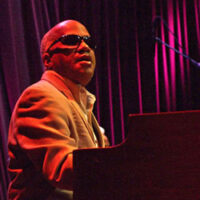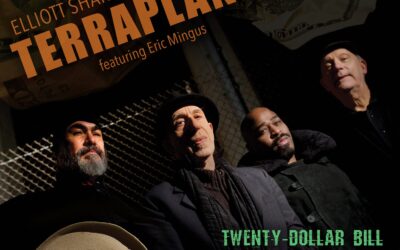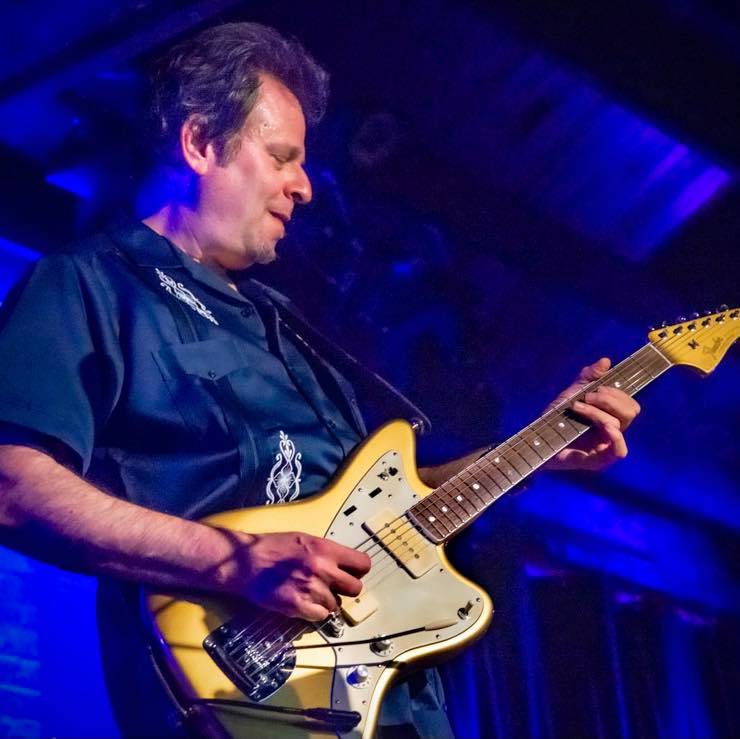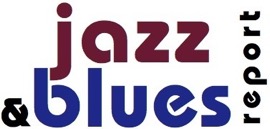
Dave Specter – Six String Soul: 30 Years on Delmark
By Jeff Johnson

Delmark Records is billing Six String Soul as “A SPECtacular retroSPECtive,” an apt description and clever play on words for this two-disc survey of Windy City guitar star Dave Specter’s 30-year career with Chicago’s iconic blues and jazz label. For the uninitiated, it’s a fine jumping-off point to his deep and varied recorded output. And for longtime fans, the set allows for enlightening comparisons between the old and the new as well as the guitarist’s amazing range of styles. As producer, songwriter and frontman, Specter displays an uncanny knack throughout for capturing the best work from an impressive array of guest artists and a score of Delmark stalwarts who’ve added their talents to Specter’s discs.
The two discs contain 14 tunes each, nine with vocal performances and five instrumental workouts. Together they clock in at nearly 2 ½ hours, a listening party that rarely lags in energy or quality.
Beginning with three tunes from Bluebird Blues, Specter’s 1991 Delmark debut featuring vocalist Barkin’ Bill Smith, and wrapping up with “The Ballad of George Floyd,” Specter’s poignant 2021 digital single with Chicago harpist-vocalist extraordinaire Billy Branch, the fast-paced romp is rich with highlights.
To further liven things up, I’d suggest a guessing game of “Name That Soloist” whenever Specter swaps riffs with such accomplished six-string slingers as Ronnie Earl, Lurrie Bell, Steve Freund, Jimmy Johnson and Jorma Kaukonen. Specter never engages in head-cutting, but is content to complement the styles of his guests. He’s equally committed in service of the tune when he accompanies singers as diverse as Jesse Fortune, Tad Robinson, Floyd McDaniel and Otis Clay. Specter is at his most spectacular backing the late soul/blue/gospel great Clay on the Bobby Blue Bland showstopper “This Time I’m Gone for Good,” one of four album tracks from their underappreciated 2014 collaboration Message in Blue. Also enjoy Specter at his rhythmic peak with the instrumentals “The Stinger” and “Sanctifunkious.” You’ll find that Specter came out of the box as a fully formed axman and evolved into the artist he is today during his 30-year Delmark odyssey
CLICK HERE TO VISIT CHICAGO BLUES NEWS

Review: ‘Dave Specter Six String Soul: 30 Years on Delmark’
by Bill Kopp
Dave specter’s new double album Six String Soul celebrates his three decades as a recording artist. The compilation features a dazzling array of guests, including Otis Clay, Lurrie Bell, Jack McDuff and more.
Guitarist Dave Specter was associated with the Delmark record label long before he was signed as an artist. The Chicago guitarist was taught by New York-born Steve Freund, who had moved to Chicago in 1976 and worked for the label (and at Bob Koester’s legendary Jazz Record Mart). Specter picked up the guitar in the early ‘80s when he was just 18. In the decade that followed, he established himself in the city’s blues clubs, first as a sideman (to Son Seals and others) and then as leader of his own band, the Bluebirds.
Specter joined the Delmark roster in 1991, releasing his debut, Bluebird Blues, featuring fellow guitarist Ronnie Earl and vocal powerhouse Barkin’ Bill Smith. Over the next three decades – and in between a heavy gigging schedule that found him playing more than 200 dates a year in the U.S. and Europe – he would release a dozen albums. All are well-regarded, though a few – including 1994’s Blueplicity, and 2004’s Is What it Is (the latter featuring Spector’s mentor Freund) come in for special praise among blues aficionados.
The occasion of Specter’s 30-year anniversary with the label is occasion for a career retrospective. And the 2CD Six String Soul serves that purpose. A chronological overview of the guitarist’s catalog, the album does more than simply pick and choose from among the many highlights found on Specter’s releases. It highlights Specter’s Chicago roots and shines a light on the connections he has with other well-regarded musical figures from Chicago and well beyond.
Specter’s early releases lean in a warmly traditional Chicago blues style, and while he’s the billed performer, Specter often cedes the limelight to his singers. But there are plenty of instrumental cuts that demonstrate Specter’s sill, finesse and stylistic variety. There’s a soul jazz sensibility on “Wind Chill” (form Specter’s debut) that owes a debt to Wes Montgomery while delivering an authentic blues feel. Six String Soul draws three of its 28 tracks from Bluebird Blues.
Some of the more recent material in the collection signals a change for Specter. Beginning with 2019’s Blues from the Inside Out, he has stepped up to the vocal mic for selected tunes. Alongside his stinging lead guitar on that album’s loping title track, Specter acquits himself well as a singer, with a vocal character reminiscent of Elvin Bishop.
That track is one of four from the 2019 record (also featuring Jorma Kaukonen and Brother John Kattke) to be included on Six String Soul. And every one of his albums for Delmark – including the live set form 2008 – is represented here. Also featured are select cuts from two albums he made with others: Al Miller’s Wild Cards from ‘95 and Floyd McDaniel’s 1997 West Side Baby, recorded live shortly before McDaniel’s passing. Those tracks underscore the fact that Dave Specter is as comfortable working as a sideman as he is fronting a band.
Even though it’s designed as a retrospective of one man’s career, the defining characteristic of Six String Soul is variety. Dave specter’ style is rooted in Chicago blues, but he’s equally at home playing jazz, and that feel comes through in his guitar work. And while he’s a fine songwriter himself – working alone and with co-writers – Specter has shown himself to be a superb interpreter of the works of others. All those qualities are highlighted (and balanced) across Six String Soul’s pair of CDs.
The collection closes with a new track that had previously been available only in digital format. The subdued yet heartfelt “Ballad of George Floyd” is a topical tune featuring vocals by Billy Branch. It’s a fitting tribute to man whose untimely death served as a societal flash point. Specter provides an emotion-filled guitar solo.
As a sampler of three decades of work form a fine musician, Six String Soul is an effective collection. And because it seeks to draw representative tracks from his catalog (as opposed to “hits”), it can serve as an introduction for listeners new to his music. Longtime fans can enjoy it for its well-curated set of songs; newcomers may well find that Six String Soul kick-starts their appreciate of the Chicago guitarist, sending them back to pick up other items in his back catalog.
CLICK HERE TO VISIT ROCK & BLUES MUSE

FRENCH MAGAZINE “SOUL BAG” also gives a brilliant review to Dave Specter’s “Six String Soul”. Thank you Jean-Luc Vabres, Nicolas Teunier & Soul Bag Magazine.
In order to honor a beautiful pledge of loyalty, Delmark Records offers us a compact double bringing together the recordings of the native Chicago guitarist made over the past three decades. Over the years and the various collaborations, the number of big names invited to perform alongside him in Riverside Studios is simply breathtaking: Ronnie Earl, Lurrie Bell, Jorma Kaukonen, Steve Freund, Lynwood Slim, Sharon Lewis, Tad Robinson, Jesse Fortune, Brother John Kattke and Lenny Lynn have joined the musician who has a crazy class on the six strings, in order to burn excellent albums. What a pleasure also to find Barkin ‘Bill Smith with a pure jump blues entitled Buzz Me , the late Floyd McDaniel for the magnificent Saint Louis Blues, but also organist Jack McDuff who with Unleavened Soul magnificently explores the Jazz side loved by the one who for many years has been at the head of the Space club, in the suburbs of Chicago, in Evanston. The legends of the Windy City are also present, as in their habits, Jimmy Johnson and Otis Clay unroll all their classes on the compositions Feel So Bad and This Time I’m Gone For Good , while Willie Kent with Seventy Four always gives as much goosebumps thanks to its unique vocal involvement. Closer to us, alongside an inspired Billy Branch, the moving composition Ballad of George Floydstrongly emphasizes that Dave Specter is also a committed citizen and fights in his own way against the endemic evils which have unfortunately crossed American society for many generations. Here is a wonderful compilation that will satisfy the most demanding amateur, because the range of African-American music is presented here with talent in its most beautiful setting. – Jean-Luc Vabres
CLICK HERE TO VISIT SOUL BAG MAGAZINE
###

Dave Specter Six String Soul – 30 Years on Delmark
30 Years on DelmarkDelmark Records. Yes, it’s really been 30 years that Chicago guitarist extraordinaire Dave Specter has been part of the Delmark Records family. 30 years! To commemorate Specter’s longevity with the label, Delmark has released a two-disc compilation of 28 recordings, both on his own albums as well as accompaniment of other artists from the label.Six String Soul – 30 Years on Delmark is a very nice look at this man’s career, and also refreshes our collective memories of past singers like Barkin’ Bill Smith, Jesse Fortune, Floyd McDaniel, and others.
While Delmark has previously issued past anthologies from their long and glorious history, with this album fitting in nicely as still another tribute to the iconic Chicago-based label.This collection should be cherished for bringing back recordings of the wonderful singer Barkin’ Bill Smith, whose rich, throaty voice resonates on the first cut of disc one, “Buzz Me,” and later on “Railroad Station.”
We’re also treated to the marvelous “Fortune Tellin Man” from Jesse Fortune, a song that I’ve never been able to get enough of. Fortune was a vastly underrated singer in his day, and his album by the same name was and still is an absolute gem. Soulful blues singer Tad Robinson, who’s still very much on the scene today, shows up on two cuts on disc one, with “Sweet Serenity” coming from the Blueplicity album that they did together, and “Can’t Stay Here No More” from an album that also included Al Miller, Willie Kent and Steve Freund.A highlight of disc two comes on the opening cut, with Lenny Lynn handling vocals with his jazzy, charcoal voice on “Blues On My Mind,” sounding very much like a classic slow B.B. King blues. That song was originally released on Blues Spoken Here, billed to both Specter and Lynn. I haven’t heard that full album in a long time, so I’ve got to give that one a spin to remember what I’ve been missing.
Chicago blues veteran Jimmy Johnson joins in on “Feels So Bad,” while blues shouter Sharon Lewis hooked up with Specter for the mid-tempo blues shuffle “In Too Deep.”Specter’s soul side is given plenty of time with a pair of numbers featuring Otis Clay on vocals. “Got To Find A Way” is up-tempo and uplifting, while Clay switches to a slow, plodding blues, “This Time I’m Gone For Good,” with killer blues guitar from Specter. I’m not too familiar with Brother John Kattke, but the Chicago guitarist / singer joins Specter on two numbers, the mid-tempo shuffle “Chicago Style,” featuring plenty of big horns, and the funky “March Through the Darkness.”Of course, there are also plenty of instrumental gems throughout the album, with one of my favorites being “Sanctifunkious,” as jazz organist Jack McDuff and a whole lot of horns join forces with Specter for this jazzy masterpiece.
Closing the collection is a recent single released by Billy Branch and Specter. The title “Ballad of George Floyd” tells us what we need to know about its contents, and it’s a slow blues with plenty of emotion packed into Branch’s vocals.Six String Soul is another important anthology commemorating both Specter and the Delmark label. Not only will I being playing it quite often, but it will also motivate me to go back to listen to the full albums from which these 28 songs originated.— Bill Mitchell
CLICK HERE TO VISIT BLUES & BYTES

SOUNDGUARDIAN, from Croatia, gives another amazing review to Dave Specter’s “Six String Soul”. Thank you Mladen “MIke” Loncar!
Otis Clay, Jimmy Johnson, Ronnie Earl, Lurrie Bell, Billy Branch, Willie Kent, Jorma Kaukonen, Brother Jack McDuff, Steve Freund, Barkin ‘Bill Smith, Lynwood Slim, Sharon Lewis, Floyd McDaniel, Tad Robinson, Jesse Fortune, Lenny Lynn and there are more, these are all great names included in a really great retrospective arranged on two CDs and titled, “Six String Soul-30 Years On Delmark,” proudly signed by Dave Specter.Dave Specter was born on May 21, 1963 in Chicago. Very early on, he became interested in music, especially music that has its origins in the traditional music of the American continent. His influences include famous and legendary blues masters, such as: T-Bone Walker, Pee Wee Crayton, Magic Sam and Otis Rush. Equally, Dave makes it clear in his music that jazz influences, like Kenny Burrell’s music, are not foreign to him.He developed and discovered his love for the guitar relatively late, at the age of less than 18, encouraged and inspired by the music of his older brother Howard. In addition, he started taking guitar lessons from Steve Freund, a guitarist in the band of the famous Sunnyland Slim. He really gave him a lavish lesson and then sent him on tour with drummer Sam Lay and the brilliant guitarist of the great Howlin ‘Wolf, Hubert Sumlin.
In addition, Dave has performed with Johnny Little John and Son Seals. All this simply could not go unnoticed. Namely, the well-known jazz and blues record label Delmark Records from Chicago is releasing eight albums in a row, all of which were recorded for this record label. Of these, I definitely want to highlight the albums: Bluebird Blues (1991), Blueplicity (1994), Live In Europe (1995), Is What It Is (2004), Live in Chicago (2008) and Message in Blue (2014). .). And, here, on October 22, Delmark Records proudly announces the release of this double compilation album, the music content of which we can only enjoy, for almost a full two and a half hours with, indeed, impressive music content.
A very inspired and effective combination of blues, jazz, soul and r & b will certainly leave the excellent fans of this musical style without lyrics.Of course, over the years Dave has worked, collaborated and constantly played with numerous jazz and blues musicians, and here I would single out collaborations with legendary jazz organist Brother Jack McDuff, and blues musicians: Tad Robinson and California harpist Lynwood Slim. To this day, Dave Specter has certainly built an international reputation and affirmation for himself, as a blues guitarist, producer and capable frontman and lead man in the band. In addition, every day he is more and more respected by younger musicians and future generations of future musicians, who are yet to become so. It is, of course, no wonder that, thanks to his past work and professional career, Dave has worked and performed with a number of well-known rock, soul, blues and jazz musicians. Thanks to all this, his experience is very strong, so for this reason we can easily determine all the above musical influences and, accordingly, his extremely original fusion really gives such good and quality results.
Of course, such an impressive compilation requires a certain knowledge and understanding of this musical genre.On this double compilation release of “Six String Soul-30 Years On Delmark” we can hear very clearly how great Dave is doing and that everything, literally, radiates that inspired fusion of soul, r & b, jazz and blues. Something so convincing and honest we can still hear from the albums of the great Duke Robbilard and Ronnie Earl. There is the remarkable and, unfortunately, late soul legend Otis Clay (Otis Lee Clay (February 11, 1942 – January 8, 2016)), who still with his powerful and convincing blues / R&B vocals literally takes the audience’s breath away.Specter’s latest compilation album is great proof that he certainly has the role of front man and, no doubt, that he dictates the complete musical story with his stylistic lines. Dave, too, has and provides a truly wide range of his presentation form from the effective blues riffs and warm tones of his guitar to the raucous, nuanced jazz phrases, imbued with deep feelings, reflected in the murky waters of the Mississippi. The songs on offer are mostly instrumental, and they seem to tell us that this musician, guitarist, is very much immersed in that famous Chicago blues style.
Although primarily an instrumentalist, Dave also writes lyrics that are so distinctively vocally modeled by the famous singer, a true Chicago soul music legend, the late Otis Clay. On the other hand, Dave proved with everyone that the blues is a strong foundation for further and deeper, more concise searches and trials in other musical styles, but which are imbued with a strong sense of the blues. And this double album is true proof of all that. After all, listen to the whole album in peace and you will see for yourself that I was not mistaken in the slightest, quite the opposite!
RECOMMENDATION Dave Specter’s double compilation album “Six String Soul-30 Years On Delmark” will provide you with truly enjoyable and relaxing moments. And that is why, with its content, this album undoubtedly shows how the music of this Chicago blues musician is sincere, sensitive, luxurious, high-quality and inspiring in every respect. And those are without a doubt the main reasons to look for this album.And all of you who know this musical style will surely immediately recognize the value and importance of the album in front of you, and I also know very well that you will convey a message about your positive experiences orally and get and listen to this album as soon as possible. There is no better recommendation, and, believe me, there is really something to hear. CHECK IT OUT !!!
CLICK HERE TO VISIT SOUNDGUARDIAN
DAVE SPECTER Six String Soul: 30 Years On Delmark DELMARK RECORDS, review Jazz-Blues.com
As Dick Shurman observes on the back cover of the liner booklet for “Six String Soul,” Dave Specter does not look old enough to be subject to a thirty year career retrospective. Yet it has been 30 years since Specter’s first album, “Bluebird Blues,” which he shared with singer Barkin’ Bill Smith. Delmark has compiled two discs with 28 tracks from fifteen albums and a recent digital single of nearly two and a half hours of music.
What an impressive career Specter has had. It opens with three tracks from the album with Barkin’ Bill Smith, on which Ronnie Earl also played, and closes with the digital single “The Ballad of George Floyd” by him and Billy Branch. There are so many legends and greats to be heard, including Otis Clay, Jimmy Johnson, Jesse Fortune, AL Miller, Willie Kent, Floyd McDaniel, Sharon Lewis, Bob Stroger, Jack McDuff, and Lurrie Bell. There are several selections with Tad Robinson. Regular members of his bands of three decades include Ken Saydak, Mike McCurdy, Mark Fornek, Harlan Terson, Mike Schlick, Rob Waters, Brother John Kattke, and Marty Binder.
It is an All-Star line-up of artists he has recorded with over these years. There are so many superb tracks, including “Railway Station Blues” with Barkin Bill Smith’s singing and Specter’s T-Bone Walker-inspired guitar to Floyd McDaniel’s rendition of “St. Louis Blues.” There is his interpretation of Magic Sam’s instrumental “Riding High” to the evocative string work of “West Side Stroll.” Jimmy Johnson is stellar performing “Feel So Bad,” Sharon Lewis is terrific on “Inside Out” while Otis Clay is riveting on “This Time I’m Gone For Good.”
There is much more here, of course, and throughout, Specter plays with considerable fire, taste, and invention. As Dick Shurman observes, Dave Specter has “become a leading practitioner, mentor and advocate for the music he loves.” “Six String Soul” is a fabulous career retrospective of his journey to reach this point. Highly recommended. RON WEINSTOCK
CLICK HERE TO VISIT JAZZ & BLUES REPORT
ALSO FROM ITALY…
GRAMMY Museum Presents ‘Songs Of Conscience, Sounds Of Freedom’ featuring “The Ballad of George Floyd” by Dave Specter

Songs of Conscience, Sounds of Freedom, curated by the GRAMMY Museum in Los Angeles, examines the role music has played in informing and inspiring social consciousness throughout American history.
Charting a path from spirituals sung by enslaved people in America and the songs and sounds of the American Revolution, to the mass movement of music and art that helped to stir action during the Civil Rights Movement of the 1960s, to the continued fight for racial justice in America today, the exhibit spans time and genre to tell the stories of music’s role as a source of inspiration and education. Songs of Conscience, Sounds of Freedom opens on Sat, January 15, 2022, and runs until May 8, 2022.
Songs of Conscience, Sounds of Freedom was first on display at the GRAMMY Museum when it opened in Los Angeles in 2008. In the 13 years since that initial run, the exhibit has been updated to include the Black Lives Matter movement, songs that fight for LGBTQ+ rights, and how music from artists like H.E.R., Dave Specter, and Mickey Guyton continue the traditions of using music as an agent and catalyst for social change.
Additionally, Songs of Conscience, Sounds of Freedom will include a newly expanded section, “The Sounds of Los Angeles,” that explores Los Angeles-based social movements and events that have inspired protest songs spanning a variety of genres and communities, the Chicano Movement that formed during the 1960s and 1970s, the 1965 Watts Riots/Rebellion, the 1992 Riots/Uprising, and the city’s history of poverty and economic disparity, gang violence, and police corruption. Featured artists include Lalo Guerrero, Mark Guerrero, Frost, Kim Weston, Randy Savvy of Compton Cowboys, Chuck D, and more.
“Songs of Conscience, Sounds of Freedom returns to the GRAMMY Museum at a particularly relevant time,” said Bob Santelli, Founding Executive Director and Exhibit Curator. “Although socially and politically conscious songs have healed and inspired generations throughout our history, it feels especially significant to showcase the power of song as a unifying force and agent of change in the midst of America’s current struggles for equality.”
Songs of Conscience, Sounds of Freedom will also include “Song Spotlights,” individual video displays that feature artists talking about a specific socially conscious songs:
Andra Day discusses Billie Holiday’s “Strange Fruit”
Noel Paul Stookey recalls the importance of Bob Dylan’s “Blowin’ in the Wind”
Ziggy Marley discusses his father’s song “Get Up, Stand Up”
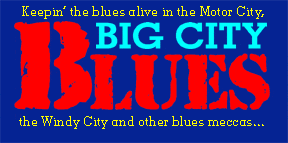
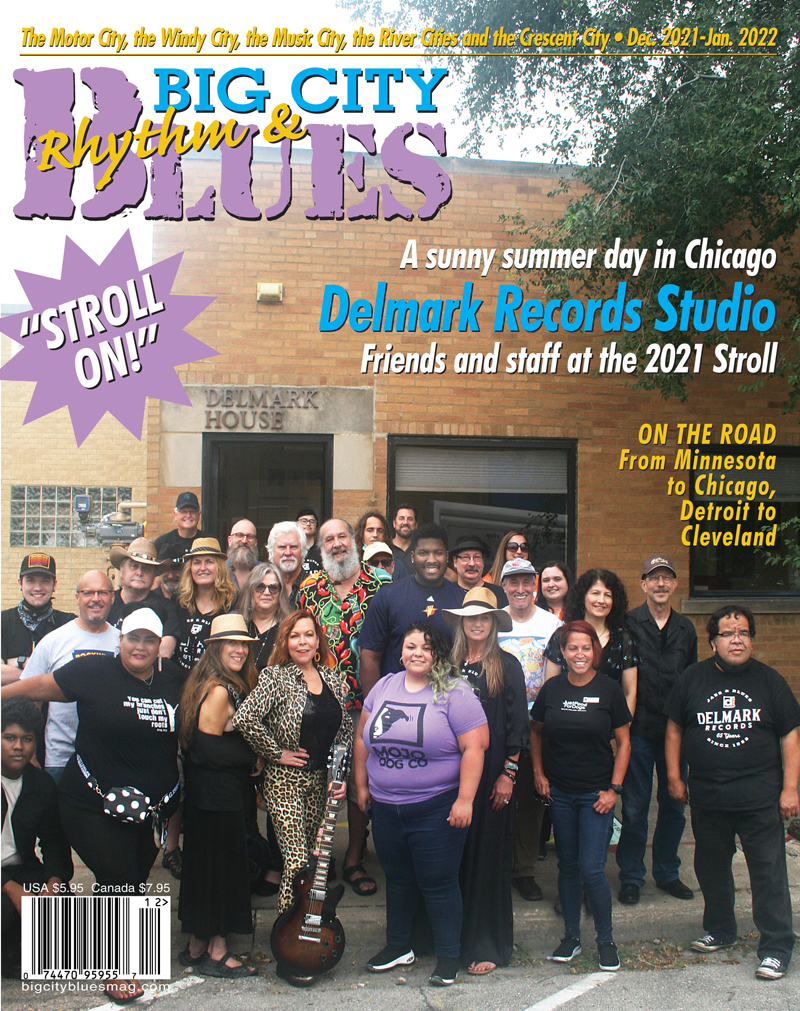
Dave Specter
Six String Soul
Delmark 2021
Guitarist Dave Specter is a Chicago native and by now a well-known and respected member of the musical scene of that blues mecca. He has been part of the roster of the fabled Delmark label for three decades, during which time he has delivered multiple fine albums while playing with many blues giants and leading his own band. A retrospective (restoSpecter?) is certainly warranted, and Delmark provides it with a full two-and-a-half hours of guitar variety and mastery.
Specter straddles the line (if there is one; some claim there isn’t) between blues and jazz…as does another acknowledged master of the six string, Ronnie Earl. Fittingly, Earl collaborates on the first two tracks of the compilation, which are culled from “Bluebird Blues,” Specter’s initial release in 1991. Earl and Specter each give juicy and soulful leads on “Buzz Me,” with a fine vocal by Barkin’ Bill Smith, and the instrumental “Wind Chill.” Somewhat frustratingly, Specter’s partnership with Earl here, and with other guitar maestros later in the compilation, has a lead guitar sequential call-and-response format; there is virtually no simultaneous interplay of the two leads.
That “complaint” is really nitpicking, because there is no dearth of dazzling guitar playing throughout this recapitulation of Specter’s career to date. The samples from his albums are arranged chronologically, and other guitarists with whom he pairs include Jimmy Johnson, Lurrie Bell, Steve Freund, and Jorma Kaukonen. Many other fine musicians over the years have lent expert backing. Names that you will recognize: bassist Bob Stroger, singers Otis Clay, Tad Robinson, and Willie Kent, and pianist Barrelhouse Chuck. Most of those with lesser public renown lay down equally fine performances.
Specter’s range encompasses funk, shuffles, and both wistful late hour nightclub and back porch gutbucket blues. About a third of the tunes are Specter originals, and most of the rest are covers of lesser-known songs. An exception is “Feel So Bad,” done memorably by Little Milton Campbell; Specter’s version benefits from Brother John Kattke on organ and Jimmy Johnson on vocal and second guitar. Also notable is “Get Back Home,” a straight-ahead blues a la the style of the defunct Hollywood Fats Band, with the late Lynwood Slim (Richard Duran) dealing out the vocal.
Specter has introduced his own singing in the last few years, and his tenor efforts are workable. The extensive compilation closes with his most recent release, the topical single “The Ballad of George Floyd,” sung by Specter and with adept harmonica by Billy Branch. Hearing it and this collection makes one hope that Dave Specter and Delmark Records continue their partnership for years to come.—Steve Daniels
Click here to visit BIG CITY RHYTHM & BLUES!

ABS BLUES MAGAZINE
Dave specter
Six String Soul
Delmark Records DE 870 – www.delmark.com
In order to honor a beautiful pledge of loyalty, Delmark Records offers us a compact double bringing together the recordings of the native Chicago guitarist made over the past three decades. Over the years and the various collaborations, the number of big names invited to perform alongside him in Riverside Studios is simply breathtaking: Ronnie Earl, Lurrie Bell, Jorma Kaukonen, Steve Freund, Lynwood Slim, Sharon Lewis, Tad Robinson, Jesse Fortune, Brother John Kattke and Lenny Lynn have joined the musician who has a crazy class on the six strings, in order to burn excellent albums. What a pleasure also to find Barkin ‘Bill Smith with a pure jump blues entitled Buzz Me , the late Floyd McDaniel for the magnificent Saint Louis Blues , but also the organist Jack McDuff who withUnleavened Soul magnificently explores the Jazz side loved by the one who for many years has been at the head of the Space club, in the suburbs of Chicago, in Evanston. The legends of the Windy City are also present, as in their habits, Jimmy Johnson and Otis Clay unroll all their classes on the compositions Feel So Bad and This Time I’m Gone For Good , while Willie Kent with Seventy Four always gives as much goosebumps thanks to its unique vocal involvement. Closer to us, alongside an inspired Billy Branch, the moving composition Ballad of George Floydstrongly emphasizes that Dave Specter is also a committed citizen and fights in his own way against the endemic evils which have unfortunately crossed American society for many generations. Here is a wonderful compilation that will satisfy the most demanding amateur, because the range of African-American music is presented here with talent in its most beautiful setting. – Jean-Luc Vabres
Click here to visit ABS MAGAZINE!
MAKING A SCENE
Dave Specter Six String Soul – 30 Years on Delmark
November 5, 2021
Dave Specter
Six String Soul – 30 Years on Delmark
Delmark
Guitarist Dave Specter lives up to the enticing album title Six String Soul, with his career-to-date selection of 28 remastered tracks spanning his three decades with Chicago’s Delmark records. It’s so tempting to engage in the kind of wordplay found in the liner notes – a SPECTacular career retroSPECTive that we’ll just go ahead. To be fair, Specter is more than just a guitarist. He is a songwriter, producer, arranger, bandleader, and has recently become a vocalist too. Currently he is enjoying a rewarding career surge that is arguably is stronger than any, coming off his acclaimed 2019 Blues From the Inside Out and his digital single with Billy Branch, “The ballad of George Floyd.” He could conceivably have another three decades left.
Specter plays in a clean, no-effects style, demonstrating versatility across soul, jazz, funk, and several styles of blues. He is assertive, dependable, and always in ‘chops up’ mode. It’s tempting to compare his clean, rich tone to Ronnie Earl or to Jimmie Vaughan, but he doesn’t come across with the spirituality of the former and his Chicago stylings differ from Vaughan’s Texas traits. Due to Specter’s versatility, we’ll stay away from the term ‘signature style’ that we may easily associate with the other two. It seems that Specter is as influenced by Chicago greats Jimmy Johnson and Son Seals as he is by blues leaning jazz guitarists such as Kenny Burrell and Wes Montgomery.
The testimony to any artist’s greatness is usually reflected in the musicians that have accompanied him on his journey. Consider these names that adorn these tracks, many of them legendary – Otis Clay, Jimmy Johnson, Ronnie Earl, Lurrie Bell, Billy Branch, Willie Kent, Jorma Kaukonen, Jack McDuff, Lynwood Slim, Sharon Lewis, Jesse Fortune, Bark’ Bill Smith, Steve Freund, Floyd McDaniel, Tad Robinson, Lenny Lynn, and Brother John Kattke.
The project moves chronologically beginning with his debut, 1991’s Bluebird Blues with Barkin’ Bill Smith and Ronnie Earl with “Wind Chill,” an instrumental featuring Earl, and the T-Bone Walker styled “Railroad Station Blues” featuring Smith as the two standout tracks. Two selections come 1992’s Fortune Tellin’ Man and just one form 1994’s Blueplicity. Disc One begins to pick up some steam with vocalist Tad Robinson’s performance on “Sweet Serenity from 1995’s Live in Europe and again with horn-slathered, Robinson led “Can’t Stay Here No More” from 1995’s Wild Cards. Both tracks from 1996’s Left Turn on Blue are among the strongest, “Get Back Home” with vocalist Lynwood Slim and the late pianist Barrelhouse Chuck and the instrumental with a conventional jazz quintet, “Unleavened Soul,” featuring Jack MacDuff on organ. Disc One ends with a scintillating jump blues version of the classic “St. Louis Blues” from 1996’s West Side Baby and the ever-soulful traditionalist Lurrie Bell on “You’re Gonna BE Sorry” from 1998’s Kiss of Sweet Blues.
Disc Two begins by excerpting one track each from Blues Spoken Here (1998), Speculatin’ (2000), and What It Is (2005). Essentially, these build momentum into the strength of this disc, found in tracks 4-8 and then at the end where we have four selections from the recent Blues From The Inside Out with Jorma Kaukonen and Brother John Kattke as well as “The Ballad of George Floyd” with Billy Branch, which has been selected for the exhibit “Songs of Conscience, Sounds of Freedom” at the Woody Guthrie Center, curated by the Grammy Museum. But let’s return to those five aforementioned tracks, arguably the best consecutive sequence in this terrific 2-CD set. The venerable living legend Jimmy Johnson leads on “Feel So Bad’ followed by the Koko Taylor-like Sharon Lewis with “In Too Deep,” both from Live in Chicago (2008). Next are three from 2014’s Message in Blue with Otis Clay on “Got to Find a Way” and “This Time I’m Gone for Good” which is features Specter’s most incendiary solo on the entire set. Brother John Kattke does a whole lot of name dropping in the swinging “Chicago Style.” While we’re here on Message in Blue, the instrumental “The Stinger” with horns, is one of the set’s best instrumental tracks too.
This writer covered Blues From The Inside Out for another outlet and feels that it’s one of the strongest blues albums in recent years. Here is the lead paragraph – Versatile and virtuosic blues guitarist, Delmark Records’ Dave Specter just may have made his strongest, most expressive album in his 35-year career. Proving that it’s never too late, he makes his debut as a vocalist here on Blues from the Inside Out, a date that also features the renowned Jorma Kaukonen who plays on two of Specter’s originals, one a co-write. In addition, fellow Chicago keyboardist and vocalist Brother John Kattke joins on this mix of blues, soul, funk, gospel and jazz, adding his vocal to four tracks. Three of Specter’s tunes address hope, inspiration, and finding strength during these troubled times when even a U.S. President gets booed at a World Series game. Specter has own vocal version of booing POTUS 45 in “How Low Can One Man Go?” Interestingly, this set contains one of the political songs, “March Through Darkness” but omits the one about POTUS 45 (no need to give any further publicity we suppose).
The sequencing of songs across the two CDs is chronological but it’s rather striking that there is a similar arc to both, building slowing, finding some terrific heat midway, cruising, and then finding additional heat at the end. Careers often go that way too. At present Specter is at the top of an arc and we can hope that his trajectory rises from here. There’s plenty of life left in those six strings and he’s only just started to sing.
- Jim Hynes
Click here to visit MAKING A SCENE!
BMAN’S BLUES REPORT
Delmark Records artist: Dave Specter – Six String Soul – New Release Review

I just had the opportunity to review the most recent release, Six String Soul, a double cd release by Dave Specter and it’s great. Celebrating 30 years on Delmark, with remastered recordings from throughout his career and celebrating many guests. Opening with Buzz Me Specter on guitar, is joined by Barkin Bill Smith on vocal and Ronnie Earl on guitar as well as Ken Saydak on organ, Dez Desormeaux on sax, Red Groetzinger on sax, Mike McCurdy on bass and John Hiller on drums. Very cool. Specter really stretches out nicely on solo guitar on slow blues, Railroad Station. Smith, on lead vocal does a real nice job and Bob Stroger on bass anchors the track. Saydak’s piano is a nice accent and sax soloing by Groetzinger is really nice. I really like instrumental, Specter’s Walk, with it’s deep jazz groove. Specter cruses on guitar, Desormeaux’s sax solo is rich, and Saydak’s organ work is strong. Tad Robinson has lead vocal on Sweet Serenity. I’ve always been a fan of Robsinson’s vocals and Specter really gets this track swinging on guitar. Very nice. West Side Stroll is another terrific instrumental, showcasing Specter’s dynamic guitar style. Backed by Mike McCurdy on bass and Mark Fornek on drums, another great track. Seventy-Four is a strong slower blues with Willie Kent on lead vocal and bass. This is the style of track that really gets Specter in the slot. His lead soloing is tops and with Fornek on drums, another highlight of the release. Lynwood Slim has the mic on Get Back Home, a strong shuffle. Mike Scharf on bass, Barrelhouse Chuck on piano and Fornek on drums hold a tight bottom and Specter nails it on guitar. Very nice. Kenny Lynn really adds depth to the release with his powerhouse vocals on Blues On My Mind and Rob Waters’ organ solo is dynamite. Low slung, In Too Deep, features Sharon Lewis on lead vocal and Specter’s guitar doing his talking. With Brother John Kattke on piano, Harlan Terson on Bass and Marty Binder on drums, this is a great shuffle. The Blues Ain’t Nothin’ features a cool pairing of Specter and Jorma Kaukonen on lead guitars with Harlan Terson on bass, Marty Binder on drums, Kattke on keys and lead vocal, Mars Williams on sax, John Janowiak on trombone and Ron haynes on trumpet. Wrapping the release is Ballad of George Floyd with Specter on guitar and vocal with Billy Branch on vocal and harmonica backed by Danny Shaffer on acoustic guitar and Brother John Kattke on organ. This is a really terrific retrospective and a great addition to your collection.
Click here to visit B’MAN’S REPORT

Monthly Album Spotlight: Dave Specter Six String Soul
Delmark Records has just released a wonderful career retrospective on one of great musicians of our time and space.
Dave Specter is a first-rate guitarist who has delighted audiences for decades with both his virtuosity and versatility. Yet, it is his impeccable taste that won this fan over many years ago. Specter has made spectacular choices throughout his 30-year association with Delmark Records. This two-disc, 28 song retrospective speaks to all of this.
Six String Soul features Specter accompanying a long list of very accomplished vocalists such as Barkin’ Bill Smith, Jesse Fortune, Otis Clay, Tad Robinson, Lynwood Slim and others. These performances are all first rate. They sit beside instrumentals which showcase the jazzier side of the blues. This spectrum of Specter’s muse represents some of my favorite recordings of his career.
The only track that has never been presented on any of the fourteen albums during Specter’s long association with Delmark, is the 2020 digital release entitled The Ballad of George Floyd. Here he is joined by Billy Branch who blows harp and trades vocals with Specter. This song conveys the sensitivity and urgency that this subject matter demands.
The entire album has been remastered by Julia A. Miller at Delmark’s Riverside Studio in August, 2021. In doing so this package has been elevated to more than a greatest hits recital. Even though Six String Soul shows a definitive career arc, the songs hang together in a very cohesive fashion, thanks in no small part to Miller’s contribution to the project.
The recording and discographic information on Six String Soul are intelligently laid out. The entire presentation is in chronological order. The recording notes not only include all the musicians present on each track, but the album from which the selection originally appeared.
Six String Soul: 30 Years on Delmark can serve as a nice primer for those music fans who are new to the music of Dave Specter. For long-time fans of his music, I believe that this package will be just as enjoyable. It is like taking a pleasant stroll through some familiar terrain with a brand-new pair of shoes. Six String Soul: 30 Years on Delmark is a welcome addition to our library here at the JUNCTION and an album that I highly recommend.
– David Mac





